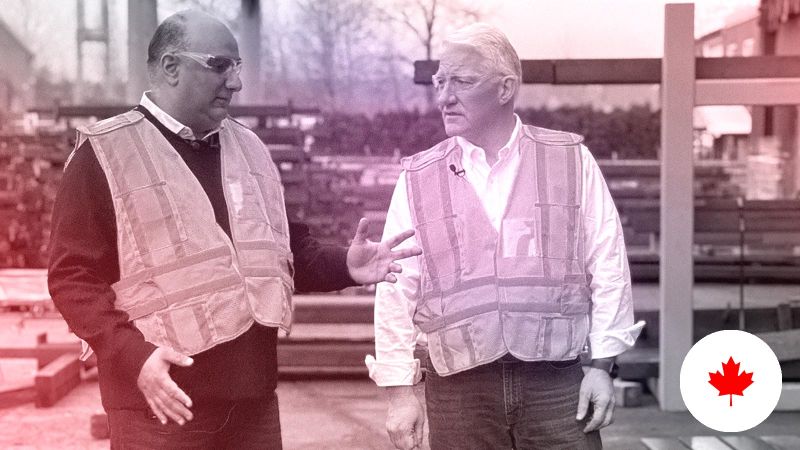Surrey, British Columbia
CNN
—
Karim Walji is certain he is about to lose business. Worried he may have to shrink his workforce — fire people — for the first time in eight years. He blames President Donald Trump and what Walji sees as a reckless power trip.
“He wants the US to flex their muscle,” said Walji, a partner in AI Industries, a steel fabricating plant in western Canada. “He wants to show that the US is strong and, ‘Because I am bigger than you are, I can bully you around, and this is how I am going to do it.’”
Last week, AI Industries was a shining example of one of the world’s most remarkable and lucrative trade relationships; US-Canada trade totals just shy of $800 billion annually. This week, it is a casualty in Trump’s new trade war: Almost all goods coming from Mexico and Canada are subject to a 25% tariff, while goods coming from China are subject to a 20% tariff. All of this is likely to result in slower economic growth and higher costs for consumers.
The British Columbia visit was the first international foray for our All Over The Map project, which is shifting from its initial focus on the 2024 campaign to the impact of the new administration’s policy agenda.
AI Industries is just one example of the economic and human consequences, both at home and abroad, of Trump’s moves to reshape America’s key trade relationships.
“We essentially are not competitive in the US anymore, so our business model in the US is gone,” Walji said in an interview. “About 75 percent of our work right now is actually US-based. We do projects in Washington state, Alaska, the odd job in Hawaii. That market is essentially shut down for us.”
We visited a few days before the Trump tariffs took effect, and the plant was humming. Giant steel beams on one belt were moved into position for custom cuts and drill holes. On another, a worker welded angled braces.

In the yard, beams were tagged and stacked neatly: American steel, shipped across the border by rail for custom fabrication. Some of it for a new high-rise in Vancouver. Some of it soon to be shipped back across the border for an office project in Alaska.
Now, Walji said, everything will change. Trump on Wednesday said he would delay tariffs on automobiles from Canada and Mexico for a month. But the tariffs on other Canadian products are now in place. “A killer,” is how Walji described them.
Canada said it has no choice but to impose retaliatory tariffs.
So, Walji said, Canadian builders will look for alternatives to US steel. And Walji is likely to lose many of his American customers, if they have to pay tariffs when the steel passes back into the United States each time the steel crosses the border.
“We’ve got to find other markets, otherwise they lose their jobs,” Walji said of his 100 workers. “Here in BC, the market isn’t big enough to support a company like ours.”
Walji has no doubt American families will pay, too.
“Inflation, costs going up,” he said. “Your infrastructure projects — schools, highways, hospitals, office buildings — all of these are construction items. All these things will go up in price.”
American companies will suffer too, Walji said. Speciality steel fabrication requires enormous, expensive machines. “Made in the USA” is on almost all of the big cutters and drillers at AI Industries. The machines range in price from $400,000 to nearly $1 million, and Walji said several are due to be replaced. But with Canada’s retaliatory tariffs in place, he said he would purchase new machines from Europe — not from the Illinois company that has been his supplier for years.
It is not just that Canadians believe Trump is practicing bad economics — bad math. They are also offended by his bad manners; constant references to Canada as the 51st state and its prime minister as “governor.”
“I find it very insulting,” Walji said. “It’s disrespectful.”

British Columbia is a living postcard, with scenic mountains and farmlands and gorgeous waterways. The importance of trade is just about everywhere you look. Canadian lumber stacked and wrapped at river’s edge waiting to be shipped. Rail yards filled with cars carrying Canadian crude oil and farm products and more. Truck after truck heading to and from the docks and rail yards.
“If you watch for eight hours, you’ll see on average we’ve got 10 ships arriving and 10 ships leaving,” said Peter Xotta, the CEO of the Port of Vancouver. “We did about 160 million tons of cargo last year. Seventy-five percent of that is those bulk commodities. Grain, coal, potash, sulfur and other agricultural products.”
Xotta said a protracted trade war would be devastating. “The economic activity here is very dependent on north-south trade,” he said.
But he also said Trump’s tariffs and tone had Canada rethinking things.
“It’s been a wakeup call for Canadians that we need to figure out a way to be not as dependent,” he said.
Vikram Vinayak likens it to a bad dream.
Vinayak is a father of two, an immigrant who came to Canada in 2019 to be with his wife and start a family. He loves his job as short haul truck driver, but says he has no choice but to look for a new one.
Right now, he has as many as five runs a day and works 40 to 50 hours a week. But between 80 percent and 90 percent of his shipments are headed to the United States. With the new tariffs, “the number of loads will decrease, and my hours will also decrease.”
He sometimes heads to Seattle to shop, and the family took a Las Vegas vacation last year. But “nowadays because of the tariffs everything is getting intense. I can’t think of going anywhere.”

Darryl Lamb is the brand manager at Legacy Liquor Store. Suddenly he’s in the crosshairs of a trade war.
In addition to the Canadian government’s reciprocal tariffs, the premier of British Columbia is taking additional steps to show displeasure with Trump. The province is banning sales of American alcohol brands from states Trump won in 2024 that also have Republican governors.
So Kentucky bourbon is exempt, because Gov. Andy Beshear is a Democrat. But Jack Daniels and other Tennessee whiskeys would be banned. Yellow Rose Bourbon is from Texas, as are Tito’s and Deep Eddy vodka. It is Lamb’s job now to get them off the shelves.
“We’ve gone through this before with the Russian invasion of Ukraine,” Lamb said. “We were asked to remove all Russian products from our shelves.”
In the days before the tariffs kicked in, Lamb said some customers raced to stockpile American favorites before they were banned. But other customers got testy with store employees, demanding that all American products be taken off the shelves because of Trump’s tariffs and insults.
“There are a lot of people that are passionate,” Lamb said. “Canadians love their country, you know, and when you hear ‘governor’ and ‘51st state’ and all this stuff.”
He urges angry customers to stay calm, or to write their member of parliament. But he understands their anger with Trump and his not-so-neighborly broadsides.
“We’ve been together for a long time,” Lamb said. “We fought wars together. We went to Afghanistan. We did all this stuff together. Why? What are you doing here?”

